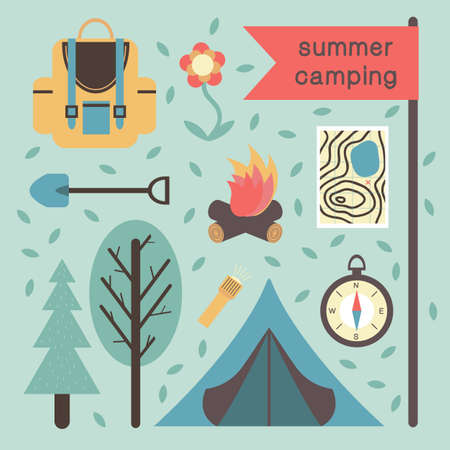Understanding Coastal and Countryside Camping in the UK
When planning a camping trip in the UK, its important to recognise the delightful differences between pitching your tent by the British seaside and setting up camp in the rolling rural countryside. Each setting offers its own unique charm, scenery, and traditions—so your packing list should be thoughtfully tailored to suit your destination. Coastal camping invites you to wake up to the sound of seagulls, explore sandy beaches, and perhaps even enjoy a classic fish and chips supper on the promenade. In contrast, countryside camping immerses you in tranquil woodlands, vibrant meadows, and charming villages where cream teas and friendly locals are never far away. Understanding these cultural highlights ensures that you’re prepared for everything from brisk sea breezes to muddy footpaths, making your family adventure both comfortable and memorable.
Essential Clothing for British Weather
When packing for a camping adventure in the UK, whether you’re heading to the blustery coast or the gentle countryside, preparing for ever-changing British weather is key. The right clothing can turn a soggy weekend into a comfortable family memory! Let’s take a look at some practical attire choices and classic British favourites that will keep you cosy, dry, and ready for anything—because even on sunny days, a sudden shower might pop by to say hello.
Dressing for Coastal Breezes
Seaside camping often means cool winds and salty spray. Lightweight but windproof jackets are a must, as are breathable layers underneath. Dont forget a snug hat to keep ears warm during those sunset walks along the beach. Sturdy trainers are great for sandy paths, but if you’re exploring rock pools or pebble beaches, wellies (Wellington boots) are the UK’s go-to footwear for keeping toes dry and happy.
Outfits for Rolling Hills and Countryside Rambles
The countryside offers lush fields and woodland trails—but also mud, morning dew, and sometimes brambles! Waterproof trousers and jackets help you stay clean and dry when the grass is wet or the sky decides to drizzle. Layering is your best friend: start with a base layer to wick away moisture, add a cosy jumper or fleece, then top off with your waterproof outerwear. Don’t forget thick socks for extra comfort during long walks.
British Camping Clothing Checklist
| Item | Coastal Camping | Countryside Camping |
|---|---|---|
| Waterproof Jacket | Essential (windproof preferred) | Essential (breathable & durable) |
| Layers (base + mid) | Lightweight & quick-dry | Thermal or fleece recommended |
| Wellies (Wellington Boots) | Ideal for wet sands/rock pools | Perfect for muddy fields/trails |
| Sturdy Trainers/Walking Boots | Great for sand dunes/paths | Best for uneven countryside terrain |
| Hat & Gloves | Wind protection (lightweight) | Warmth during chilly mornings/evenings |
| Waterproof Trousers | If planning coastal hikes in rain | Highly recommended for tall grass/wet areas |
| Socks (multiple pairs) | Cotton or wool blends (quick-dry) | Thicker options for warmth & comfort |
| Poncho/Umbrella | Compact option for surprise showers | Poncho easier on windy hills than umbrella! |
A Little Local Wisdom:
No matter where you’re pitching your tent, it’s always wise to pack more layers than you think you’ll need. In the UK, “four seasons in one day” isn’t just an old saying—it’s often reality! With these trusty essentials packed, your family can focus on making memories rather than worrying about the weather.

3. Coastal Camping Kit
If your family is setting off for a seaside escape along the UK’s rugged coastline, packing smartly will make all the difference between a breezy adventure and a blustery bother! Here’s what you simply can’t leave behind for a coastal camping trip:
Windbreaks & Shelter
The British seaside is famous for its brisk winds, so pop a sturdy windbreak in your boot. It’ll shield little ones from gusts while you picnic or build sandcastles, and it helps mark out your spot on a busy beach.
UV Protection
Even when the sun peeks through those classic British clouds, UV rays can be surprisingly strong by the sea. Bring wide-brimmed hats, plenty of child-friendly sunscreen, and lightweight long sleeves to keep everyone safe under the sun.
Tide Timetables & Beach Safety
Check local tide times before you go and keep a printed timetable handy. The UK’s tides can change rapidly, especially in places like Cornwall or Norfolk. This way, you’ll always know when it’s safe for rock pooling or paddling, giving you peace of mind as children explore.
Buckets, Spades & Beach Toys
No British beach holiday is complete without buckets and spades! Add in a few fishing nets for rockpooling adventures or a frisbee for family fun—these simple toys encourage creativity and togetherness by the waves.
A Trusty Thermos
There’s something wonderfully comforting about sipping hot tea while watching the surf roll in—even more so if it’s drizzly outside. Pack a thermos filled with your favourite brew (and perhaps some biscuits tucked away) for that classic British seaside treat, sure to warm hands and hearts alike.
With these essentials packed, your coastal camping experience will be full of happy memories, hearty laughs, and plenty of good old-fashioned British seaside fun!
4. Countryside Camping Checklist
Planning a countryside camping adventure in the UK means immersing yourself in rolling hills, lush woodlands, and tranquil streams. Rural escapes offer a different charm compared to the coast—think gentle walks through wildflower meadows, spotting deer at dawn, and picnicking in sheltered dales. Here’s how to pack for an unforgettable countryside experience while ensuring comfort, safety, and plenty of family fun.
Essentials for Rural Camping
The British countryside can be unpredictable, so preparing with the right gear is key. Start with sturdy walking boots—paths may be muddy or uneven, especially after a spot of rain. Layers are vital; mornings can be chilly even in summer. Don’t forget a waterproof jacket and quick-dry trousers for unexpected showers.
Navigation & Safety
Ordnance Survey maps are a must-have for countryside walks. Mobile signal can be patchy in rural areas, so having a physical map and a traditional compass ensures you stay on track and discover hidden gems off the beaten path.
Picnic & Cooking Gear
Countryside camping wouldn’t be complete without an alfresco meal. Pack fire-safe picnic gear like a portable stove or BBQ (following local guidelines), and reusable cutlery and crockery to minimise waste. Always check if campfires are permitted at your site before lighting one.
Checklist for Countryside Fun
| Item | Purpose | UK Tip |
|---|---|---|
| Sturdy Walking Boots | For safe trekking across varied terrain | Waterproof boots are best for year-round UK weather |
| Ordnance Survey Map & Compass | Navigation during walks or hikes | Choose the correct map number for your area (e.g., OS Explorer OL24 for Peak District) |
| Waterproof Jacket & Layers | Stay dry and comfortable throughout the day | Packed layers make adjusting to changing weather easy |
| Fire-Safe Picnic Gear | Cooking and eating outdoors safely | Use raised BBQs or stoves to protect grassland habitats |
| Wildlife Watching Kit (binoculars, guidebook) | Spotting birds, deer, foxes, and more | Pack a local wildlife identification book—it makes nature walks even more exciting for children! |
| Sunscreen & Insect Repellent | Protection from sunburn and midges/flies | Midges can be bothersome near water—bring repellent especially in Scotland or the Lake District! |
| Torch or Headlamp with Spare Batteries | Navigating the campsite after dark | A headlamp keeps hands free for evening marshmallow toasting or bedtime stories in the tent. |
| Reusable Water Bottles & Snacks | Stay hydrated and energised during rambles | British-made oat bars or flapjacks are perfect pocket snacks! |
This thoughtful checklist will help your family soak up every moment of country life—from early morning birdsong to stargazing before bed. With these essentials packed, you’ll be ready to explore winding footpaths, savour hearty picnics, and create memories that last well beyond your trip.
5. Family-Friendly Additions
When packing for a camping adventure in the UK, including thoughtful extras can turn an ordinary trip into treasured family memories. Whether your journey leads you to the dramatic coastline or the tranquil countryside, having the right gear ensures everyone—especially little explorers—stays happy, comfortable, and safe.
Coastal Camping Essentials for Families
If you’re introducing your children to the wonders of rock pooling or fossil hunting along the British coast, consider bringing:
- Bucket and spade sets – Perfect for sandcastle competitions and collecting seaside treasures.
- Child-friendly wetsuits – The North Sea and English Channel can be brisk, even in summer, so these keep little ones warm during paddling or swimming.
- Water shoes – Essential for protecting tiny toes from sharp rocks or slippery seaweed in tidal pools.
- Pocket-sized wildlife guides – Spotting crabs, starfish, and shells is even more magical with a colourful spotter’s guide.
- Windbreaks or pop-up shelters – Give your family a cosy base on blustery beaches.
Countryside Camping: Keeping Curious Minds Engaged
If your campsite is nestled among rolling hills or ancient woodlands, these additions will help your family get the most from nature:
- Bug-catching kits and magnifying glasses – Encourages gentle exploration of Britain’s woodland creatures and insects.
- Binoculars – For birdwatching or spotting deer at dawn; a wonderful way to inspire future nature lovers.
- Storybooks about local legends – Gather round the campfire to share tales of Robin Hood in Sherwood Forest or Arthurian legends in Cornwall.
- Pocket journals or sketch pads – Capture observations of wildflowers, fungi, and animal tracks along rambling footpaths.
- Glow sticks or head torches – Make night-time toilet trips less daunting and allow for magical after-dark games like hide-and-seek.
Safety First: Peace of Mind for Parents
No matter where you pitch your tent, some universal items are must-haves for family peace of mind:
- Comprehensive first aid kit with plasters, antiseptic wipes, and antihistamine cream for unexpected bumps or insect bites.
- ID wristbands for younger children, noting your contact details in case someone wanders off while exploring.
- Sunscreen and hats, as even overcast UK days can cause sunburn after hours outdoors.
- Reusable water bottles, ensuring everyone stays hydrated during long walks or beachcombing adventures.
Togetherness Above All
The best packing tip is to involve your children in choosing what goes into their own rucksack. Not only does it teach responsibility, but it also builds excitement before you set off on your coastal or countryside adventure. With these family-friendly additions tailored to Britain’s great outdoors, you’ll be well-equipped to make joyful memories whatever landscape you explore together.
6. Safety, Rules, and British Etiquette
Whether you’re pitching your tent along the wild coastal cliffs of Cornwall or nestled in a peaceful countryside meadow, it’s important to camp responsibly and respectfully in the UK. Let’s explore some key safety tips, rules, and cultural expectations to ensure your family’s adventure is both memorable and mindful.
Leave No Trace Principles
The British countryside and coastline are treasures for everyone to enjoy, so always follow the ‘leave no trace’ approach. Pack out everything you bring in, including rubbish, food scraps, and even biodegradable items like orange peels. Teach children how to spot litter and make a game out of cleaning up your area—nature will thank you!
Respecting the Local Environment
Wildlife and plant life in the UK can be delicate, especially in protected coastal zones or areas of outstanding natural beauty. Stick to marked paths to avoid trampling wildflowers or disturbing nesting birds. When camping near sheep pastures or farmland, close gates behind you and keep dogs under control. Remind little ones not to pick flowers or chase animals—it’s all part of learning to be kind guests in nature’s home.
Navigating British Camping Customs
The ‘Right to Roam’
England and Wales have more restricted access than Scotland, where the ‘right to roam’ means you may camp wild with care. In England and Wales, always seek landowner permission for wild camping or choose established campsites. Respect signs that say ‘private’ or ‘no camping’—it’s considered very impolite (and sometimes illegal) to ignore them.
Polite Campsite Behaviour
British campers value peace and privacy. Keep noise levels down after dark and greet neighbours with a friendly wave or quiet “hello.” Use shared facilities considerately: leave toilets tidy, don’t hog water taps, and queue patiently if needed. If you’re using a barbecue or campfire (where allowed), make sure it’s off the ground and fully extinguished before bed—smoky fires can annoy other campers and damage grass.
Family-Friendly Reminders
Help children understand the importance of sharing space with others and being gentle with nature. A little kindness goes a long way in making friends on site—and sets a great example for young adventurers! By packing your manners alongside your wellies, you’ll fit right in wherever your family pitches up.
7. Preparing for the Unexpected
When camping in the UK, one thing is certain: the weather has a mind of its own! Whether you’re pitching your tent by the sea or nestled among rolling hills, it’s wise to be ready for anything. Here are some friendly tips to help families handle those surprise downpours, sudden chilly nights, or even an impromptu dash to the nearest chippy.
Stay Dry and Cosy
Surprise showers are part and parcel of British camping. Always pack a reliable waterproof jacket for everyone in the family, as well as spare socks and quick-dry trousers. Pop a few extra bin liners or dry bags into your rucksack to keep clothes and electronics safe from unexpected rain.
Beat the Chill
The countryside can feel particularly brisk at night—even in summer—while coastal breezes can leave you shivering after sunset. A warm fleece layer, hats, and gloves are must-haves. For little ones, consider packing an extra blanket or two and perhaps a hot water bottle if there’s space in your kit.
Snacks on Standby
Nothing says British camping like sharing fish and chips under the stars! If plans change or you fancy a treat after a blustery beach walk, have some coins or a payment card handy for spontaneous trips to local takeaways. It’s always fun to look up nearby chippies before you set off—many seaside towns have their own famous spots.
Local Tips for Making Memories
Chat with campsite owners or fellow campers about hidden gems nearby; from secret picnic spots to walking trails only locals know about. And don’t forget to embrace the unpredictability—sometimes those rain-soaked moments or late-night adventures become the best stories to share when you’re back home.
Packing with flexibility in mind ensures that whatever surprises come your way, your UK camping experience remains safe, snug, and full of smiles for the whole family.


